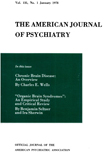The "intoxication state of consciousness": a model for alcohol and drug abuse
Abstract
The author describes a model of intoxicant use based on altered states of consciousness and reviews his own and others' research on marijuana to illustrate the utility of this model, which is derived from both introspective reports and observed data. The relationship of social behavior and cognitive functioning to the "intoxication state of consciousness" is discussed. This state of consciousness may have an adaptive value in engendering and stabilizing social cohesion. Possible treatment implications include cognitive labeling of cues that precipitate episodes of abuse, training for moderated drug use while patients are intoxicated, and providing abusers with altered consciousness through other means, such as meditation.
Access content
To read the fulltext, please use one of the options below to sign in or purchase access.- Personal login
- Institutional Login
- Sign in via OpenAthens
- Register for access
-
Please login/register if you wish to pair your device and check access availability.
Not a subscriber?
PsychiatryOnline subscription options offer access to the DSM-5 library, books, journals, CME, and patient resources. This all-in-one virtual library provides psychiatrists and mental health professionals with key resources for diagnosis, treatment, research, and professional development.
Need more help? PsychiatryOnline Customer Service may be reached by emailing [email protected] or by calling 800-368-5777 (in the U.S.) or 703-907-7322 (outside the U.S.).



